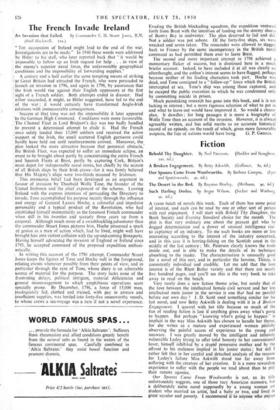The French Invade Ireland
An Invasion that Failed. By Commander E. H. Stuart Jones, R.N.
(Basil Blackwell. 2 is.)
" Tun occupation of Ireland might lead to the end of the war. Investigations are to be made." In 1940 these words were addressed by Hitler to his staff, who later reported back that " it would be ' impossible to follow up an Irish request for help . . . in view of the enemy's superior naval force, the unfavourable geographical conditions and the impossibility of forwarding supplies."
A century and a half earlier the same tempting means of striking rat Great Britain had attracted the French, who were persuaded to ,:launch an invasion in 1796, and again in 1798, by assurances that ! the Irish would rise against their English oppressors at the first '.`sight of a French soldier. Both attempts ended in disaster. Had 'either succeeded, it might, as Hitler suggested, have led to the end -.of the war ; it would certainly have transformed Anglo-Irish .relations with immeasurable consequences.
Success at that time was not the impossibility it later appeared to the German High Command. Conditions were more favourable. The Channel Fleet in Lord Bridport's day was too badly handled to prevent a determined attempt to elude it. Had the French once safely landed their 15,000 soldiers and received the active support of the Irish, the small scattered English garrisons could hardly have held out until reinforcements arrived. Moreover, the plan looked the more attractive because that perennial obstacle,- the 'British Fleet, was expected to suffer an immediate eclipse, an event to be brought about partly by concentrating the entire French and Spanish Fleets at Brest, partly by capturing Cork, Britain's main depot for indispensable naval stores, but chiefly by the seizure ;of all British ships by their Irish crews—for it was firmly believed that His Majesty's 'ships were two-thirds manned by Irishmen.
This erroneous belief had been developed as an argument in favour of invasion by Theobald Wolfe Tone, the founder of the United Irishmen and the chief exponent of the scheme. Leaving :''Ireland with the express intention of persuading the Directory to -invade, Tone accomplished his purpose mainly through the influence .and energy of General Lazare Hoche, a colourful and impulsive personality and a typical product of the Revolution, who had established himself momentarily as the foremost French commander when still in his twenties and scarcely three years up from a corporal. Although much more of a swashbuckling adventurer than the commander Stuart Jones pictures him, Hoche possessed a spark of genius as a man of action which, had he lived, might well have brought him into violent collision with the up-and-coming Bonaparte. Having himself advocated the invasion of England or Ireland since ,1793, he accepted command of the proposed expedition enthusi- astically.
In writing this account of the 1796 attempt, Commander Stuart Jones keeps the figures of Tone and Hoche well in the foreground, relating events whenever possible from their points of view, and in particular through the eyes of Tone, whose diary is an admirable source of material for the purpose. The story lacks none of the frustrating delays, political intrigues, material deficiencies and general mismanagement to which amphibious operations seem specially prone: By December, -1796, a force of 15,000 men, inadequately fed, clothed and trained, with pay in arrears and insufficient supplies, was herded into forty-five unseaworthy vessels, to whose crews a sea-voyage was a rare if not a novel experience.- Evading the British blockading squadron, the expedition ventured forth from Brest with the 'intention of landing on the stormy shores of Bantry Bay in midwinter; The plan deserved to fail and did. Not a soldier was put ashore. Of the forty-five ships, six were wrecked and seven taken. The remainder were allowed to stagger back to France by the same incompetency - in the British naval command as had permitted them ever to leave Brest. The second and more important attempt in 1798 achieved a momentary flicker of success, but is dismissed here in a much briefer account. Indeed, to have included it at all was clearly an afterthought, and the author's interest seems to have flagged, perhaps because neither of his reading characters took part. Hoche was dead, and Tone consigned to a " follow-up " force which the British intercepted at sea. Tone's ship was among those captured, and he escaped the public execution to which he was condemned only by committing suicide in prison, Much painstaking research has gone into this book, and it is not lacking in interest ; but a more rigorous selection of what to put in and what to leave out would have improved it. So would a clearer plan. It dawdles ; for long passages it is more a biography of Wolfe Tone than an account of the invasion. However, it is always agreeably written, and has solid merits as an accurate historical record of an episode, on the result of which, given more favourable auspices, the fate of nations would have hung. G. P. GRIGGS.


































 Previous page
Previous page